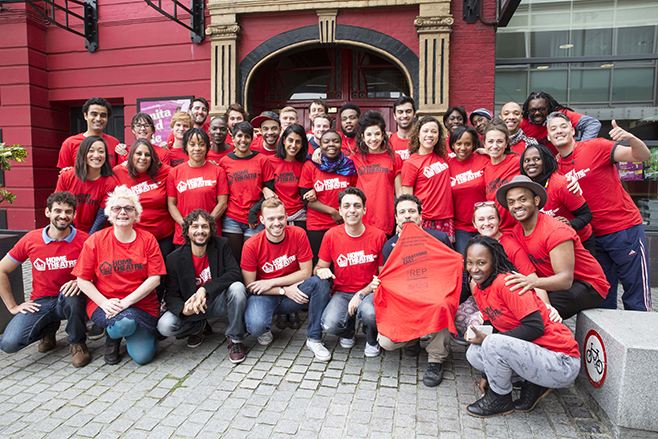Home Theatre: shows inspired by the lives of Londoners

The Home Theatre UK Project
Take thirty volunteer hosts from thirty homes (private or institutional). Add thirty actor-devisers. Fold in thirty filmmakers with iPads, documenting performances prepared from stories that hosts want invited audiences to hear. Leaven with visiting South African and Brazilian Home Theatre practitioners. Bake for five days with six directors adjusting and encouraging daily ferment. Serve at the same moment at homes across London, at 7.30 p.m. on 17 October 2015. Frost with an open symposium on theatre-beyond-theatre-spaces. Serve to the public by posting on the Theatre Royal Stratford East’s website, one show every twenty minutes.
This recipe describes the highly organised, frenetic quality of a multi-site bake-off in which the competition is time, since all devisers and directors are hired for only a week, and the product is a collaboratively-created performance gift for hosts to share with their guests. The performances are personal and reflect what it is to live in London now.
Participating in Home Theatre
As a theatre academic from the US who was asked to document the project, I jumped into the midst of it on the first day, starting with energetic full group warm-ups and instructions. Actor-devisers then fanned out across the city to meet their hosts and to gather stories. I worked with a group of six actors, associate artist/filmmakers, and their director, PoojaGhai. I followed deaf actress, Caroline Parker, her interpreter and filmmaker to a maisonette in Notting Hill, where we heard stories about what gentrification has done there. In a very different setting, I followed Jo Melville and her associate filmmaker, Oliver Dickinson, to Amber Court, a care home, to hear stories of loss and survival. Watching these projects develop over the next five days was an extraordinary experience. I witnessed a director’s deftness and actors’ empathy for the lives and experiences of people with whose stories they’d been entrusted. I attended a well-received and moving performance in the Notting Hill flat, creative processes that were generously supported by funding from Calouste Gulbenkian Foundation (UK Branch).
The Home Theatre Symposium
The international symposium following the performances centred on the issue of diversity in performances sites with talks by Home Theatre practitioners, Marcus Faustini from Brazil, the originator of the project, Aubrey Sekhabi of the South African State Theatre, Tessa Walker of the Birmingham Repertory Theatre, and Kerry Michael of Theatre Royal Stratford East, who had also previously created Home Theatre projects. Directors of projects and theatre companies who have operated “without walls,” Simon Sharkey of the National Theatre of Scotland and Mathilde Lopez of the De Gabay project from the National Theatre of Wales, among other artists, presented on diverse site-oriented performances. Lively discussion about the issue of the democratizing or atomizing of theatre for small audiences followed, with agreement that to reach contemporary audiences, theatres need to adopt a “both/and” approach, moving beyond traditional productions in traditional venues to reach wider audiences with performances whose sites and contents are meaningful to local residents.
The Home Theatre Model
After total immersion in the project, I’m convinced that the Home Theatre model works in places where multiple, often marginalized, stories need to be told-and where not everyone goes to the theatre to hear such stories. Which is pretty much everywhere. Since returning to the US, I’ve heard enthusiasm about considering such a project by theatre academics/practitioners in Chicago and in Grinnell, Iowa, the small rural town where I teach. The Home Theatre model allows voices to be heard in performances that are crafted in intimate and non-threatening-but thought- and discussion-provoking-ways. Its power lies in its community roots and its simultaneousness, specificity, and democratic dissemination.
***
Lesley Delmenico is an American academic at Grinell College in Iowa who documented the Home Theatre Festival UK.
The Home Theatre Festival is a project that saw 30 bespoke performances happening across people’s homes in London, depicting stories inspired by their lives. Calouste Gulbenkian Foundation supported a symposium exploring the production of theatre for people’s homes as a follow up to the event on 19 October.
More details about the project on Theatre Royal Stratford East’s website.
